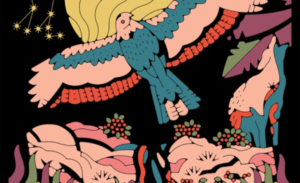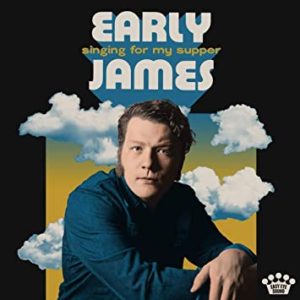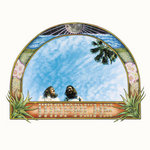Laurel Canyon Radio’s Top Albums of 2020

Laurel Canyon Radio Top 10 Albums of The Year
Yeah, yeah, yeah, about 2/3 of the music we play is old enough to vote several times over, but that doesn’t mean we don’t keep our ears to the railroads tracks when it comes to new music. After all, so many of the artists we play on Laurel Canyon Radio owe a great debt to their musical forefathers. And to that end, we enjoy passing the musical baton back and forth on the station and we hope that is what keeps our #laurelcanyonradiosound from sounding like a musty oldies station from the Seventies. So without any further ado, here is our compendium of our favorite albums of what could easily been the worst year of our lifetimes if it wasn’t for these delightful artists:
10) Jenny Reynolds – Any Kind of Angel (Released June 6 on Pretty Okay Music).
Boston born Jenny Reynolds applies a finger-style guitar to her accessible tunes with convincing vocals. Sleek as the best old-school country female singers with silky voices & a touch of alt-folk early Sheryl Crow. She sculpts interesting tales/stories from her lyrics. No showboating, no extraordinary solos, just solidly constructed tunes with attractive lyrics & an indulgent musical flavor.
On her 4th LP Any Kind of Angel, (drops June 19 – Pretty Okay) Jenny weaves significant style on songs filled with sensible lyrics, melodies & drops of melancholy. There’s an old-school charm to her showcase, with her silky-smooth country imbued vocals that possess perspective with edge.
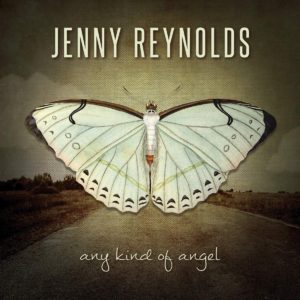 Her striking guitar crystal-clear is loaded with rhythmic musical instinct. “Any Kind of Angel,” is a perfect example of holding the right notes on the right words. Jenny’s in that special class occupied by the likes of under the radar folk-country-singers like Michigan’s excellent Carrie Newcomer, & New Zealand’s extraordinary Donna Dean (“What Am I Gonna Do?” & “Rain Fall on Me”).
Her striking guitar crystal-clear is loaded with rhythmic musical instinct. “Any Kind of Angel,” is a perfect example of holding the right notes on the right words. Jenny’s in that special class occupied by the likes of under the radar folk-country-singers like Michigan’s excellent Carrie Newcomer, & New Zealand’s extraordinary Donna Dean (“What Am I Gonna Do?” & “Rain Fall on Me”).
“Any Kind of Angel,” is a poignant tune with Warren Hood fiddle to support the warm Jenny Reynolds vocal. Here Jenny (acoustic guitar) is supported by Jaimee Harris on harmonies, BettySoo (harmonies & accordion) & Mark Hallman (drums/bass).
Produced by musicians Mark Hallman & Andre Moran (electric guitar) — recorded in Austin. Other participants: Scrappy Jud Newcomb (electric & nylon-string guitar), BettySoo also mandolin, Oliver Steck (cornet), Jenifer Jackson (harmonies) & Nat Rowe (bass) – add subtle dynamics.
Some tunes are spare. Not produced with that firecracker incendiary type of showcase. The focus is strictly on music & message. Jenny suggests that musicians have room to respond to each other & listening closely — they do.
“The Way That You Tease,” a nice jazz-inflected song with Jenny’s decorous vocal adds emotion, edge & sultriness. Oliver’s terrific cornet is brief but tight. If Jenny’s career with Americana fizzles she’d be a superb respected jazz vocalist.
“Dance with Me,” has nice Spanish finger-picking. Jenny’s lyrics are concise. Her tone continues attractive, low to high maintaining color & freshness. A solid performance that never loses its vocalese. Never reaches or goes beyond her range. Balanced to perfection. This has nightclub coquetry. I could listen all night — obviously a first-rate original artist.
It’s rare I go from track to track & find each diversified with eloquence. “Trouble I’m In,” is a blues but wholly in a Jenny Reynolds mold. Her originality shines in a genre older than all of us. Seldom are Jenny’s songs dragging or lame. Each has direction even when they don’t drive hard. The cruise is enough to be uplifting. See children, the expertise here is you can be exciting without being loud. Jenny has this. Norah Jones has it.
Each track has varied flavors like Italian pastries & cookies. Does the music last in the minds of the audience once the house lights come on? If it’s Jenny Reynolds it beautifully will.
9) Khruangbin – Dead Oceans EP (Released February 7, 2020) and Mordechai (released June 27 on Dead Oceans)
From their respective metropolises, Khruangbin and Leon Bridges offer fascinating variations on the notion of “Texas music.” The Fort Worth-based Bridges explores a strain of soul that is more closely associated with Mississippi and Chicago than the Lone Star State, while Houston trio Khruangbin dabbles in a strain of globally minded, stoner-friendly psychedelia that authorities didn’t always look upon so kindly. Today, both artists find themselves rising stars, garnering millions of streams and promoting the vision of a more diverse and open-minded Texas, the one that leads to headlines like this.
The two teamed up for a joint North American tour in 2018, but heading into the studio together wasn’t an obvious next step. Their partnership might pay dividends down the road, but at four songs in 20 minutes, Texas Sun is both tantalizing and a little half-baked. The title track gives a glimpse of how each party might bolster the other: Khruangbin bassist Laura Lee, guitarist Mark Speer, and drummer Donald Johnson impart some much-needed looseness and pliancy to Bridges’ vocals, while the singer in turn grounds their wandering with song structures and sturdy vocals. “Texas Sun” is a simmering road-trip number, with Bridges’ delivery rendering that oppressive sun into something more mellow. Khruangbin provides a head-nodding beat, but for all of their synergy, the result still resembles boilerplate Bob Seger.
The slinky “Midnight” could have been cribbed from a Numero Group Eccentric Soul compilation. Bridges’ lyrics again situate us in a moving vehicle, this time at night instead of the sweltering midday heat. They conjure a wistful mood, with lyrics that detail a new love in the passenger seat, cruising around with no particular destination in mind, smoking with the windows down, the backseat beckoning from the rearview mirror. “Put on your lavender/Perfume and a nice dress,” Bridges croons sweetly.
C-Side” boasts the sultriest groove, with Lee’s loping bassline riding behind a clopping cowbell and mallet percussion. But Bridges’ chorus is diffuse and unmemorable, and the percolating beat lingers in the mind for longer than the words. The smoky minor-key ballad “Conversion” (which has its roots in the gospel hymn “At the Cross”) showcases Bridges’ honeyed, unhurried delivery at its most effective. If anything, the four songs leave you wanting more from this collaboration, offering up brief, blurry glimpses of their Texas landscape rather than the expansive vistas that they might arrive at should they ride together a little longer.
8) Cordovas – Destiny Hotel (Released August 5, 2020 on ATO Records)
“Summer is gone,” laments Cordovas frontman Joe Firstman on “Afraid No More,” the fourth song his band’s new LP, Destiny Hotel. Given the autumn wind and the state of the world, it feels like a profundity. But Destiny Hotel isn’t merely a reflection on the change in seasons or a sociopolitical treatise. It is, at its heart, a freewheelin’ good time, consisting of 10 well-crafted tunes that radiate warm vibes and positive energy throughout.
Cordovas offer up a lively blend of thoughtful ballads, ramshackle roots rockers, and country-folk on Destiny Hotel that’s a helluva lot of fun to listen to. Each song is well written and thoughtfully constructed, but performed with a ragged freneticism that gives the material the energy and feel of a live performance.
Rockers like “Fine Line” and “The Game” evoke the sound of the Grateful Dead circa Europe ’72 and amble along with an easy shuffle. “Destiny” is in the same vein of groove-laden ’70s country rock, but it has more propulsion and urgency to it. Keyboardist Sevans Henderson is the X factor, playing some lines that give the track a dramatic flourish befitting a song about the calling of destiny.
The aforementioned “Afraid No More” is a gem of a ballad. Rooted in its simplicity and group harmonies, it speaks to the current moment in its pledge to live without fear. It pairs nicely with the very next track on Destiny Hotel, “Man in my Head.” Gone is the minimalism and tenderness of “Afraid No More.” In its place is self-doubt, paranoia, and anxiety.
I’ve started and deleted this review more time than I can count. Seriously, what can I say about Billy Strings’ 2019 Rounder release Home that hasn’t already been mentioned at this point? Billy Strings, aka William Apostol’s sophomore release comes two years after his “Turmoil and Tinfoil” debut, and certainly was one of the most anticipated releases by those in the know. I wasn’t in the know enough to realize what I was missing at the time, but I’ll be damned if I’m not getting up to speed just as fast as I can.
At this point, I think the secret is out. Billy Strings is one of the hottest concert tickets out there right now, often selling out within minutes. There’s a good reason. Apostol is probably the most enchanting guitar picker I’ve heard in years. His playing is melodic and abstract, often at the same time. He’s an exploratory and explosive player that will leave you shaking your head and smiling. Smiling a lot. Apostol and band — Billy Failing, Royal Masat and Jarrod Walker — have taken the bluegrass/jam community by storm. Myself included. No disrespect to YMSB, or SCI, but no band has captured my love of exploratory bluegrass like Billy Strings has.
Home was my first introduction. Several friends had been raving about it since its release, but somehow I never caught the bug initially. Then, I saw a live Youtube clip of “Away From The Mire” from Adult Swim and was unequivocally blown away. I checked out a few more clips that afternoon with equal enthusiasm before diving headfirst into a digital copy of Home. From the Grateful Dead reminiscent, “Space”-like intro of “Taking Water” I was hooked. Indeed, few bands since the Grateful Dead has captured my imagination and love of improvisation as Apostol and band have.
But Billy Strings isn’t dependent on just improvisational jams. He’s also a fine songwriter and composer. Many of the songs that grace Home take on a personal introspective approach, and ultimately that’s where I think Apostol’s true super power is. That’s why people are so attracted to his music. Yes, he’s a great picker, but this is music of destination rather than just a method of travel.
Standouts for me include: “Must Be Seven”, which features Molly Tuttle; the Ronnie McCoury co-written, “Highway Hypnosis”; the simply beautiful “Watch It Fall” “Enough To Leave” and “Love Like Me”; and of course my personal highlight,: “Away From The Mire.”
There’s not a mediocre track to be found on Home. It’s about as perfect an album as I’ve heard in the past few years. A perfect blend of progressive, psychedelic Bluegrass that meets traditional styles with a healthy topping of respect for those that have come before. Perhaps most interesting is Apostle’s ability to keep his head about him as his career takes exponential growth. He, family, band and crew members contribute fairly regularly on the Facebook group, Billy Strings Fanpage (Official) as well as interacting with fans at shows. Billy Strings’ Home easily was my favorite album of 2019.
6) Early James – Singing For My Supper (Released March 3 on Easy Eye Sounds/Nonesuch)
Early James, an Alabama native and the latest signing to Dan Auerbach‘s Easy Eye Sound roster, releases his debut album, Singing for My Supper, via Easy Eye and Nonesuch Records today. The album spans hard-charging blues, wistful folk, and ages-old pop crooning, anchored by the singer’s voice that oscillates from gravel-gruff shout to a honey-smooth whisper. James’ inspirations run from Fiona Apple and Tom Waits to the Southern Gothic poets, as heard in the album’s darker themes and in the wry humor with which he writes about them.
To pick up a copy of Singing for My Supper, head to your local record store, the Nonesuch Store, iTunes, and Amazon, and listen on Spotify and Apple Music.
Early James “dazzles on luminous debut … this astonishingly assured album,” says Mojo in its four-star review. “A superlative crooner with grit, soul and impeccable phrasing … When Early James sings for his supper, every Michelin-starred chef in Christendom should plate-up.”
“It sounds like his music has been floating through the American South for centuries,” says Uncut. “With a touch of the sinister, his voice swerves through a spectrum of wild emotions; folk, blues and a dreamy, eerie style of pop.”
“These songs are amazing,” says Australian Broadcasting Company’s Triple J presenter Nkechi Anele. “His voice is unlike anyone I have heard before. He sounds like he is from another era. It’s unbelievable and great.”
5) Charley Crockett – Welcome To Hard Times (Released July 31 on Son of Davy)
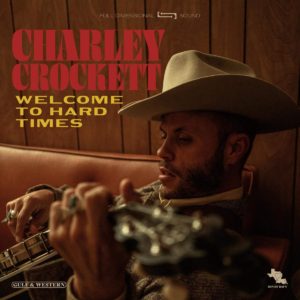 The late, great American writer E.L. Doctorow’s first novel Welcome to Hard Times (1960) was a bleak satire of old Westerns. Doctorow’s West was full of rape, murder, and revenge. Chances are Texas singer-songwriter Charley Crockett hasn’t read the book, but his website suggests he saw the dark 1967 film based on it starring Henry Fonda. Crockett’s a big fan of Westerns and pictures the songs on his latest album, Welcome to Hard Times, as a set of Western movie-like narratives. While the title song has little explicitly to do with the Doctorow book, Crockett invokes the same misery and corruption: the world is just a rigged casino where one can never get a break or even hope to break even.
The late, great American writer E.L. Doctorow’s first novel Welcome to Hard Times (1960) was a bleak satire of old Westerns. Doctorow’s West was full of rape, murder, and revenge. Chances are Texas singer-songwriter Charley Crockett hasn’t read the book, but his website suggests he saw the dark 1967 film based on it starring Henry Fonda. Crockett’s a big fan of Westerns and pictures the songs on his latest album, Welcome to Hard Times, as a set of Western movie-like narratives. While the title song has little explicitly to do with the Doctorow book, Crockett invokes the same misery and corruption: the world is just a rigged casino where one can never get a break or even hope to break even.
Crockett’s country-western songs take place in the present with an overlay of the past to show the connections between the modern world and its historical antecedents. His songs feature such tropes as bad outlaws, fast horses, gruesome killings, deceitful lovers, and such. Crockett’s also a romantic who peppers his lyrics with words like “darlin'”, “my dear”, “honey”, and other sweet endearments even though he knows his relationships with lovers will never last and end with betrayal or even murder.
The melodic accompaniment often features strummed banjos, steel guitars, saloon piano playing, and other affectations from the musical past. At times Crockett sounds like a reincarnated version of Marty Robbins or Johnny Horton because of the way he incorporates old styles into contemporary modes. Crockett’s tracks could be obscure folk songs sung around the campfire dressed up for recording, except they are not. Crockett wrote all the material except for Red Lane’s “Blackjack County Chain”, a violent chain-gang/revenge song. Lane’s song fits right in with the other 12 cuts in terms of its evocation of good and evil and how the line between them is often grey and fuzzy.
Have you seen the news lately? Things are looking pretty bleak out there, what with the coronavirus pandemic and its fallout. Concerts and other mass-attended events are being cancelled, folks are being encouraged to stay home and avoid public spaces — it’s more than a little overwhelming and terrifying.
But while you’re stuck inside, laying low, there is something you can do. You can hunker down, set some mood lighting, and bask in the warmth of some good tunes.
That’s where From Liberty Street, the latest album by California country duo Mapache, comes in handy. Sure, it’s not going to cure any viruses or manage a crisis response, but for about 40 minutes you can take your mind off the state of the world and listen to 14 well-crafted, tastefully performed tunes.
From Liberty Street isn’t so much a progression or evolution of the style Mapache unveiled on its 2017 debut, but a continuation of it. Opening track “Life on Fire” is a slice of breezy country-folk, its melody and the harmonies of Sam Blasucci and Clay Finch capturing the feel and sound of The Grateful Dead circa American Beauty.
Mapache settles into a comfortable groove across the entire album that pulls together pieces of the Bakersfield sound of ’50s country, Mexican folk, and campfire songs, music that just feels meant to be played and listened to by itinerant folks hanging around a fire at night. This vibe is best exemplified by the group’s cover of the Mexican bolero “Me Voy Pa’l Pueblo.” Its straightforward and unadorned arrangement is gorgeous, the vocals are excellent, and the overall performance feels referential to its cultural origins.
There’s a pervasive feeling of warmth that runs through From Liberty Street. Whether it’s on a song like the lovestruck “Cactus Flower” or the classic country ballad “I Just Steal Away and Pray” that closes the LP, Mapache presents its songs with earnestness and compassion.
And in these times, when social distancing is a necessity and life with a pandemic becomes the new normal, we could all use a little more warmth, earnestness, and compassion in our lives.
3) Wrong Way At The Roundabout (Independently Released April 17)
Wrong Way at the Roundabout is an alt indie rock quartet based in Seattle, WA, comprised of Richard Laqueur (guitars/lead vocals), Tom Wade (bass/background vocals), Xavier Salinas (lead guitar) and Jack Brady (drums). The band is releasing their debut self-titled album Wrong Way at the Roundabout.
Laqueur says he owes the making of the album to his recovery. He began writing music after he got sober from meth and heroin. It helped him stay clean and was something to look forward to. The band was gigging and began recording when he fell back into heavy using. But he made it out again thanks to suboxone and after ending a toxic relationship with a girl. Finishing the record helped him stay clean and it is thanks to the support of his crew that he made it out again.
Wrong Way at the Roundabout opens with “Crusin” where reverberating guitar riffs add to the atmosphere. Laqueur’s vocals are raw, filled with a gritty bluesy vibe. The music has a slow sauntering effect that also offers up a groovy funky riff. A guitar solo launches toward the two-and-a-half-minute mark. The sound is warm and soulful.
“Under The Table” is a track about his worst overdose and chronicles his downward spiral and the demons he had to face. The vibes on the acoustic guitar paves this song towards the start. Percussions and drums add that extra zing. Next, the interwoven sounds on the electric guitar reverberates overhead. The finger-picking on the acoustic guitar is intricate. The vocals eventually come in with a fully realized feel. Laqueur sings with range and emotional power.
The dynamic sounds coming from the acoustic guitar starts off “Cellophane.” The interwoven sounds of the acoustic guitar and electric guitar courses through this track. A piano melody trickles in. The vocals arrive with a sparse sound. A strong sense of urgency underlines this song. The slow burning vibe on this track makes it a definite highlight.
On “Wrong Way,” bluesy guitar riffs sound off on this song. The vocals strut in, in a straightforward manner and are sung in a spoken word performance-like feel.. The album closes on a soft note with this apt closer.
Laqueur is the main songwriter and his lyrics are auto-biographically based. With a sound that contains a blues and indie rock vibe, Wrong Way at the Roundabout layers in vocal harmonies. You can tell a lot hangs in the balance as these songs are about self-destruction, drug use, sex but also self-discovery, determination and perseverance. This collection of songs has helped Laqueur survive his addiction and hopefully they remain a beacon of hope for others who are going through the same things. Music is like that – able to bridge that gap and offer us stories and a source of comfort that connects all of us.
2) Chris Stapleton – Starting Over (Released August 27 on Mercury Nashville)
Chris Stapleton has always been the most unlikely of superstars. Slightly overweight 36-year-olds with beards and a burly countenance aren’t supposed to be the beneficiaries of the confluence of positive circumstances that powered Stapleton so high into the stratosphere of country music, he’s transcended the genre to be a superstar for all of music.
His debut album Traveller is now secured in the pantheon of legacy releases from the spectacular and sustained popularity it continues to enjoy well over five years since its initial release, while his rendition of the country classic “Tennessee Whiskey” is worthy of regarding with similar prestige and impact.
But Stapleton’s followup sessions to Traveller—specifically his 2-part From ‘A’ Room volumes—have not fared similarly for a number of reasons. Principally, they were made up of mostly previously-released material when it came to the songs, and the passion found in their short tracks lists didn’t necessarily meet or surpass his original sessions in Studio ‘A’ with producer Dave Cobb. They had their moments of course. But ultimately, the two records should probably be considered more as addendums to Traveller than dedicated followups.
This leads on to the fundamental challenge the now 44-year-old Chris Stapleton faces walking into what should be considered the true followup to Traveller. How does he take the incredible momentum enjoyed by that record, and try to extend it into this effort? For some songwriters and performers, wild success leads to a lack of passion, since goals and dreams have been accomplished, and financial ease secured. This was the scenario Stapleton found himself in while still residing in the blast radius of Traveller‘s success, trying to field new material.
But giving himself time for his creative batteries to recharge, and leaning into his strengths no matter what influences or genres they express, Chris Stapleton was able to turn in an impassioned, and quite expressive and involved record in Starting Over, that feels wholly Stapleton in style, approach, and scope.

Starting Over is a combination of Southern soul songs and straight ahead rock tracks, and a few sentimental ballads that constitute the smattering of country tunes. Guilty of being country mostly by association, Starting Over is truly more an embodiment of elemental “Americana,” meaning an amalgam of American roots influences, presented with a relative seamlessness between them.
Some of the tracks of Starting Over feel simply like launching pads, or underhanded lobs in batting practice for Chris Stapleton to smoke over the fence with his soaring, powerful, and soulful voice. “Devil Always Made Me Think Twice,” “Cold” co-written with his rhythm section of J.T. Cure and Derek Mixon, and “Whiskey Sunrise” are testaments to Stapleton’s effortless and natural delivery, and were written to be as such, while blistering guitar parts and other production rise to meet the epic nature of these efforts of blue-eyed soul.
By the time you get to “Arkansas” co-written with Mike Campbell of Tom Petty and the Heartbreakers, you’ve reached decidedly rock territory, as you do with “Hillbilly Blood.” Energy is sometimes what Stapleton can lack if he’s not careful. That’s the rumored reason Sturgill Simpson showed up to Stapleton’s Saturday Night Live gig a couple of years ago, to give the moment a little bit of a catalyst. The result was a killer version of “Midnight Train To Memphis.”
There’s no worry about lulls in energy on Starting Over, unless that’s the intent, like in the opening title track, which upon first inspection might feel like just another ho hum Stapleton song. But through the jangle of the acoustic guitar, the simplicity of the approach, and the intimacy of singing with wife Morgane, it makes for one of the better entries in the Chris Stapleton catalog, and a worthy track to title the record behind.
You can tell in moments Stapleton is still stretching for inspiration for what to write about. Any fans of puppy dogs will find favor with “Maggie’s Song,” even if writing about your dog is pretty elementary, and the track perhaps barrows a bit too much from The Band’s “The Weight.” Including a rendition of Guy Clark’s “Worry B Gone” doesn’t add too terribly much to the record, but does give it a bit of lightheartedness, which helps balance out some of the more heavy moments, whether they’re about dead dogs, lost lovers, or the tragedy in Las Vegas that resulted in the enraged moments of “Watch You Burn,” where the album reaches its cacophonous peak.
Meanwhile the truly country moments of Starting Over are some of its most sedate. “When I’m With You” reminds you intently of Willie & Waylon. “Joy of My Life” and “Old Friends” capture Stapleton’s more passive and reflective side. Don’t come expecting a lot of twang. But Starting Over is passable as country just as much as you could pass it off as anything. No specific song will barrel you over from a writing standpoint. But each track is solid, while the performances are what renders certain tracks as stellar.
Starting Over is also bookended with a more underlying message. Where the beginning title track speaks to leaving it all behind and sparking something anew somewhere else (maybe on a coast somewhere), the ending track “Nashville, TN” is very much a Dear John letter to Music City, where Stapleton has been such a fixture, and such an influence for the last decade or so. Whether it’s more metaphorical or a true sayonara, it adds a bit of intrigue to the album, and even veers a little into the country protest territory.
The greatest adversity for Chris Stapleton and Starting Over is the sentiment surrounding him as a known quantity, a sort of “been there and done that” attitude some approach his music with, especially more dedicated, hardcore music fans. He’s in a strange position as one of the few stars of substance that has ingratiated himself to the masses, which makes him easy to snub by the musical elite.
But Chris Stapleton’s talent is still undeniable, his appeal worthy of the wide recognition he enjoys, and it’s all unmistakable and captured with renewed passion in moments very much worthy of your attention on Starting Over.
-
Jason Isbell and The 400 Unit – Reunions (Released May 15 on Southeastern Records)
The “rigorous honesty” required in recovery programs is a tenet that Jason Isbell has taken to heart. Candor has been at the core of Isbell ever since 2013’s Southeastern, the record he released in the wake of his newfound sobriety and his marriage to Amanda Shires. Seven years and three albums later, sobriety remains central to Isbell’s public image, as does his union with Shires, with whom he had a daughter. Isbell doesn’t shy away from probing personal questions when he sits for an interview, a habit that may be a fruitful part of his recovery but nevertheless can give his songs the appearance of being straight reflections of his personal life.
Reunions, the fourth album he’s written and recorded since getting sober, is indeed filled with images that seem to mirror the personal life he’s talked about in public. Romances are stable but not without their struggles; characters will themselves to accept their fears; whenever a child appears it’s a girl, not a boy. Leading up to the album’s release, Isbell upped the ante by admitting to the New York Times that its creation was fraught with tension, stemming from the pressure to deliver another strong album after making, in his own words to GQ, “three good records in a row.” Buckling under his self-imposed standards, he closed himself off from Shires, who in addition to her solo career and her role in Americana supergroup the Highwomen plays fiddle in the 400 Unit, the backing band Isbell founded in 2009 who have shared album credits with the singer-songwriter since 2017’s The Nashville Sound.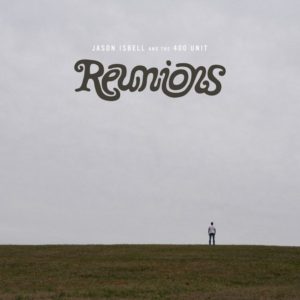
None of this agitation can be heard on Reunions. The album moves steadily and carefully, lingering on the conflicted emotions conjured by Isbell’s finely-etched tales and the band’s elegant understatement. Working once again with Dave Cobb, who has produced every one of his records since Southeastern, Isbell made a conscious effort to push the 400 Unit outside their comfort zone. What they wound up with is not with an album that blares—nothing rocks with the abandon of “Cumberland Gap,” a galvanizing number from The Nashville Sound—but one that’s so full of texture it nearly feels painted on a canvas. Waves of cool synthesizers pulsate underneath “Only Children,” whose mournful verses are accented by economical single-string runs. “Dreamsicle” unfurls with unhurried attention to detail, its bittersweet childhood memories gaining poignance as each chorus seems to be delivered with a sadder sigh. The 400 Unit can still roar—Isbell seems to steel his spine on “Be Afraid” because his group sounds tougher than their singer—but Reunions gains strength through the band’s collective interplay.
And our honorable mentions include:
Cut Worms – Sold My Soul (EP)
The Two Tracks – Three Cheers To Solitude
Marcus King – El Dorado

